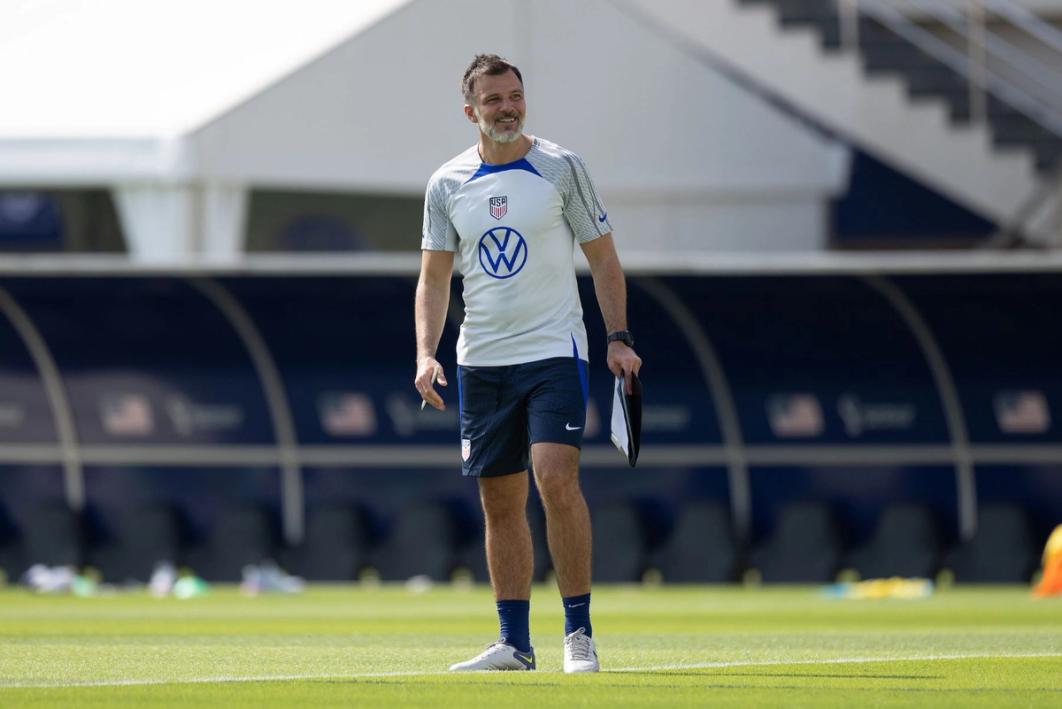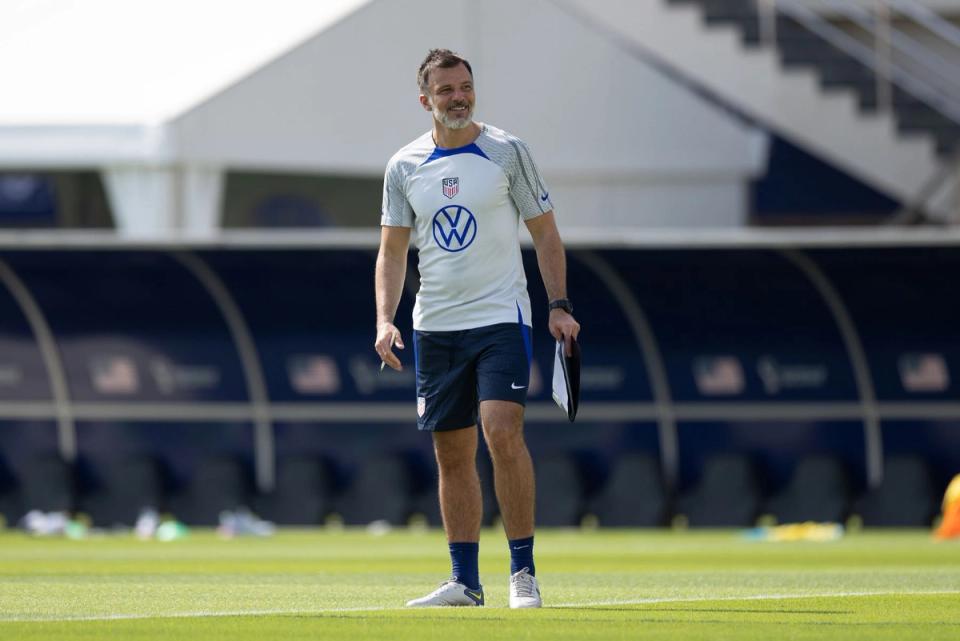Q&A: Anthony Hudson Discusses 24-Player USMNT January Camp Squad
Hudson will lead USMNT against Serbia and Colombia in Los Angeles Later This Month



Upon naming the squad for the USMNT’s 2023 January camp, head coach Anthony Hudson detailed the areas of focus for the team, what went into the selection process and what he expects the program to get out of the upcoming matches against Serbia and Colombia in Los Angeles.
ussoccer.com: What were the areas of focus in putting together this January Camp roster?
Anthony Hudson: As we were putting this roster together, the focus has been around identifying positions within our team that would benefit from more depth. And then given the time of year being a January camp, it gives us an opportunity to look at some real high-potential young players and also some players that have been on our radar for some time. This gives us an opportunity to look at them over the course of these two games.
ussoccer.com: What will your message be to the team about what you want to get out of the camp and these games?
AH: The first thing we need to do is recognize what the team has done over the last campaign. It's important that we acknowledge what an amazing job they did on and off the field and to make sure we know how that happened, what were the qualities off the field in our culture and on the field what made us a good team, and what made us the type of team that in Qatar gave a really good account of ourselves. So that's the starting point, and then just being clear that's the standard now that we've set, and we now have to keep progressing. The last thing I would say for this January camp is it's an interesting time of year because historically there's been a lot of players that have had their first or second cap in this window and then gone on to represent the country at a World Cup. The list of names that have had their first or second cap in a January window is extensive and there's some really, really big names on that list. They need to appreciate the opportunity in front of them.
So, it is first about realizing what we did, knowing that we've set a standard now and we need to keep progressing. And the other side it's an opportunity because historically we know players in this window that get an opportunity that make their debut get seen by the staff, get opportunities to then stay in the team and an opportunity to go to the next World Cup.
ussoccer.com: There's a number of players on the roster who are age-eligible for the Olympics. How important was it to get them in and to have that experience with the group?
AH: It's very important and it's a core of players that we've worked with before. Some of the guys have been right on the edge of coming into camps in the past with us, and some have been in [with the senior team]. We've followed them this whole time. So, it's good to help prepare them and to be around other high-level players, get used to it again, be around the national team set up and help for when they are preparing for the Olympics. It’s a really good opportunity for us to see some of those guys.
ussoccer.com: We have more internationally based players in this January camp than we ever have before. What was the process like for reaching out to those players and clubs and the value of having them in?
AH: The starting point was ‘who do we want to bring in?’ Who's available, who's not playing first-team football right now overseas, whether it's a young player, whether it's a dual national that we've been looking at, and let's go after it. And then there's a bunch of us just making calls speaking to the clubs, speaking to the players, and the response has been really good. I think it's made this squad stronger and gives us the opportunity to look at some overseas players that have been with us before and we haven't seen them for a little while. These are high-potential players. And the other one is to look at some dual nationals, some players that have been on the radar. This gives us a chance to bring those guys in get to know them, get to know us, and then to play in two really good games. It's great these guys are coming in and I think we were feeling very fortunate that we were able to get them because some are playing competitive games with their clubs.
ussoccer.com: On the flip side of that, you brought in five players who are part of the World Cup roster. Why did you see that as an important part of this group?
AH: The guys that we brought in that were part of the World Cup group - I think from a selfish point of view - they're amazing to work with. They're amazing people, amazing characters, and love representing the national team. Some of the phone calls I had with them, it wasn't even a long conversation. It was like ‘we're in, we're coming, you don't need to ask twice’. The other thing is these guys they know what's expected on and off the field. They know how we train, the intensity that we want to train at, and they know the standards. All of them individually have leadership skills.
The key thing is, they are good players. They've been part of what we've been doing and these guys know exactly what the expectations are on and off the field, so I'm really pleased we've got those guys in because over the course of this last campaign, some of these guys have not had a break. They've been going through January camp, Gold Cup, Nations League, World Cup … these guys have been going. So, the fact that there was no hesitation on coming in - it doesn't surprise me, but it speaks to their character and the character is one of the biggest reasons why I wanted them in.
ussoccer.com: Talk to us about the decision to bring back Paul Arriola and what went into making sure he was involved in January camp.
AH: For us the decision was simple. First of all, he can help us on the field. Secondly, he's just an incredible character. Paul is one of those people that is just incredible in the national team set up, and he's someone that we want to have with us and to help us going forward.
ussoccer.com: One of the players who's been in consideration is Club América midfielder Alejandro Zendejas, who is being allowed to join camp in the middle of the Liga MX season. What qualities does he bring and what has your or conversations with him been like?
AH: First, we're extremely grateful to the club. They've been incredibly supportive. He's one of the players that's going to play on that day that camp starts but they're going to let him fly in and play against Serbia. So, huge appreciation to the club because he was another player we wanted in but didn't think we were going to get. He's an exciting player, a technical player who plays out wide on the right or left, and has a really good final product. We’ve spoken with him and he is just super excited to come in and obviously has history with the youth national teams. He's a really, really good guy and we're looking forward to working with him.
ussoccer.com: At the end of the day there are matches against Serbia and Colombia. What will the preparations be like? What are the challenges that you face?
AH: Usually this camp is longer, and it's longer for a reason because you can help prepare the team physically because it's obviously a time of year where players are not fit or coming from offseason. With it being a shorter camp, I think the biggest challenge is just making sure that we've got a group of players who are physically in a position that we can set them up to be successful. That can also help us get through these two games at a good level. So the fitness side is one issue. With it being a shorter camp, we made a decision in collaboration with clubs to have players arriving on different days into camp because there are some players that if they don't play in their first preseason friendly with their club, then potentially the first time they're playing a competitive game will be against Serbia. I don't think that's fair on the player and I don't think it's good for our team as well. So, in individual cases we have players that are going to play with their clubs on the day we arrive in camp and then we have to think outside of the box in terms of how we get them integrated into the team and get them prepared.
ussoccer.com: On a personal note, it's obviously a unique situation in which you are taking charge of these games. What is it going to be like for you?
AH: I have to give a huge amount of gratitude and respect to Gregg Berhalter for bringing me in the first place and trusting me and allowing me to experience the last few years. So that in itself makes it a little bit difficult. However, I've been asked to take the team for a couple of games and amongst all of it is a feeling of immense pride. Having worked here for the time I have and been in the game here for a few years, one thing I know is very clear is that there's just a huge amount of passion and people that care about the national team.
The people on our staff love the team, care about the national team, and want the team to do so well. And then externally, there’s the passion of the fans. I see how much the game is growing here and how much people care about the national team. I see it when they're commenting about what we're doing and how we're doing it, good and bad. It's just incredible how much the people and fans care. So, I don't take this situation lightly. I was actually born in the States - I was born in Seattle. I grew up in a soccer family with a father that loved his time playing for the Seattle Sounders. I grew up constantly listening to stories about America because that's where he loved to play most. I always felt a very close connection to America, and so to be in this position now for however brief it is and whatever the time is, the most exciting thing is to be in a position to be able to help the team. To be stood during the national anthem, I think is just going to be a really, really proud moment for me personally.